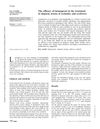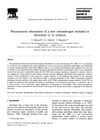 21 citations,
January 2007 in “Australasian Journal of Dermatology”
21 citations,
January 2007 in “Australasian Journal of Dermatology” Spironolactone and minoxidil together effectively treat female pattern hair loss.
 20 citations,
January 2019 in “Journal of dermatological science”
20 citations,
January 2019 in “Journal of dermatological science” Male hormones indirectly affect skin cell development by increasing growth factor levels from skin fibroblasts.
 20 citations,
September 2018 in “Journal of colloid and interface science”
20 citations,
September 2018 in “Journal of colloid and interface science” Modified keratin binds better to hair, especially bleached hair.
 20 citations,
June 2016 in “Magnesium research”
20 citations,
June 2016 in “Magnesium research” Hair follicles help magnesium get through the skin more effectively.
 20 citations,
September 2015 in “Protein expression and purification”
20 citations,
September 2015 in “Protein expression and purification” Scientists made safflower seeds produce a human growth factor that could help with hair growth and wound healing.
 20 citations,
November 2009 in “European Journal of Dermatology”
20 citations,
November 2009 in “European Journal of Dermatology” Latanoprost, a glaucoma treatment, was found ineffective in treating hair loss in eyebrows and eyelashes.
 20 citations,
October 2006 in “Skin Research and Technology”
20 citations,
October 2006 in “Skin Research and Technology” Women with AGA have less hair on midscalp, more thin and non-growing hair.
 20 citations,
January 2000 in “Dermatologic Clinics”
20 citations,
January 2000 in “Dermatologic Clinics” New psoriasis treatments are effective but come with side effects and risks.
 20 citations,
December 1995 in “International Journal of Pharmaceutics”
20 citations,
December 1995 in “International Journal of Pharmaceutics” Liposomes can make the antiandrogen RU 58841 more effective for skin application by reducing absorption, increasing skin retention, and targeting sebaceous structures.
 19 citations,
May 2021 in “Clinical epidemiology and global health”
19 citations,
May 2021 in “Clinical epidemiology and global health” Better awareness of chemotherapy's side effects improves self-care.










